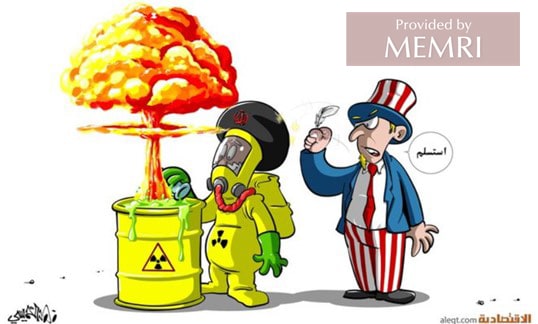Amid reports in the global media that Iran and the superpowers, headed by the U.S., are close to renewing the nuclear deal, many articles in the Saudi and Emirati press express concern regarding the emerging agreement. They note that, like the deal of 2015, the renewed one does not address the demand of the Gulf states to restrain Iran's problematic conduct in the region, and does not include firm restrictions on Iran's missile program or the terrorist militias it deploys in Arab countries. The articles warn that dismissing these concerns will exacerbate the tension and violence in the region and in the world.
The articles also accuse the Biden administration of conducting the negotiations in haste out of a desire to reach an agreement, which can be presented as an achievement to the American voter, before the U.S. Midterm Congressional Elections in November. The Biden administration, they say, was excessively weak and hesitant in the negotiations, whereas Russia and China firmly supported Iran, as a result of which Iran received many concessions and emerged as the big winner in the negotiations.
The concerns regarding the emerging deal, and the criticism against the U.S. for being over-lenient with Iran and ignoring its terror in the region, also found expression in cartoons published in the Gulf press.
This report presents some of these articles and cartoons.

While Iran prepares a nuclear bomb, U.S. hits it with a feather, saying "Succumb!" (Al-Iqtisadiyya, Saudi Arabia, August 17, 2022)
Senior Saudi Journalist: Agreement's Disregard of Iran's Military Action In Arab States Will Increase Violence In Region And World
Senior Saudi journalist 'Abd Al-Rahman Al-Rashed writes in his column in Al-Sharq Al-Awsat that the Western eagerness to renew the nuclear deal with Iran, and its disregard of this country's military involvement in Arab countries, is even more worrying than the concessions Iran may receive as part of the deal, such as the lifting of sanctions, the funds it will receive and the release of its prisoners. This disregard, he warns, can increase the tension and violence in the region and may even have global implications:
"According to the leaked information, the 'comprehensive agreement' between the superpowers and Iran is very similar to the previous agreement, and does not inspire optimism. It includes secret articles that both sides are concealing, but it won't be long before they are exposed by some angry politician or diligent journalist, as happened with the previous agreement, whose secret details amazed many people when they were made public in 2015.
"The Americans and Europeans have been negotiating in Vienna for a year and a half now, and Iran's Supreme Leader [Ali Khamenei] has only several more weeks to decide on the matter, because time is passing. The shadow of Donald Trump and the Republicans looms over the upcoming [Midterm] Congressional Elections in November [2022], and if the Democrats lose the majority in the Congress and Senate, which is likely, it will be harder and perhaps impossible to sign the agreement. In light of this urgency, the marathon of negotiations ceased, and Vienna became a delivery room where [the agreement is being delivered] by C-section. The main issues have mostly been agreed on, and what remains is the details, and that's where the devil lies. No matter what is [eventually] agreed upon, [the resulting deal is] likely to be a disfigured creature, whether or not Iran gives up its [demand] to lift the sanctions from the IRGC, whether or not South Korea transfers the $7 billion [it owes] Iran, and whether or not the Europeans release all the malicious criminals close to the [Iranian] regime.
"In my opinion, [all] these concessions in the agreement are a disgrace, but they are not as dangerous as the dismissal of the concerns regarding Iran's military activity beyond its borders – in Iraq, Lebanon, Yemen, Gaza, Syria and Afghanistan – which will pour oil on the fire. Signing an agreement and lifting the sanctions, while keeping silent about Iran's military activity abroad, will increase the tension and violence in the region. The damage will [also] reach the U.S. and Europe, renew the regional conflict and the international blocs [aligned with one side or the other], and will accelerate the expansion of the Russian and Chinese activity in the region…"[1]

West signs "nuclear deal" with Iran, while ignoring its terrorists (Al-Iqtisadiyya, Saudi Arabia, August 21, 2022)

Biden uses "nuclear deal" to scrub Iran clean of involvement in "terror" (Al-Iqtisadiyya, Saudi Arabia, August 5, 2022)
Saudi Daily: The Agreement With Iran Must Meet Gulf Demands, Halt Its Subversive Activity In Region
Similar claims were expressed in the August 21 editorial of the Saudi daily 'Okaz, headlined "The Agreement with Iran Must Meet Gulf Demands". It said: "Following the leaks about concessions made by Iran in order to advance the negotiations to revive the [2015] nuclear deal, conservative Iranian MPs have concerns about whether all the sanctions that have been imposed on Iran will actually be lifted. While all eyes are on the U.S., to see what its final position will be now that Iran has responded to the EU proposal… it has been leaked that, on the first day [of the deal's approval], three executive orders issued by former U.S. president Donald Trump are to be revoked, which means that sanctions will be lifted from 17 Iranian banks and 150 Iranian institutions, and Iran's $7 billion will be unfrozen.
"Although the new deal will meet the Western demand to deny Iran nuclear capabilities, it will not satisfy the West's allies in the Gulf as long as it fails to include strict conditions and constraints addressing Iran's actions to destabilize the region, its missile program and the concentrations of its militias in Arab countries. Despite President Joe Biden's promises at the Jeddah summit last month [July 2022], [namely] that the U.S. would not abandon its allies in the Middle East, these allies are interested in an agreement that meets their expectation [to see] a region free of weapons of mass destruction and an Iranian regime that respects the will of the international [community]."[2]

The world scrutinizes the "nuclear deal" while ignoring Iran's "support of militias" (Al-Sharq Al-Awsat, London, August 8, 2022)
Emirati Analyst: Iran Is Biggest Beneficiary Of America's Excessive Caution In Negotiations
In an August 21, 2022 article on the Saudi website Elaph, Emirati researcher and political analyst Salem Al-Ketbi complains that the U.S. is negotiating with Iran from a position of weakness and hesitation, so much so that it seems to be begging Iran to return to the 2015 agreement. As a result, he says, Iran has received many concessions and is emerging as the big winner in the negotiations:
"I don't see a big difference – which justifies the effort invested in the current negotiations – between Iran attaining a nuclear weapon today or tomorrow. Because the threat exists, and Iran's provocative behavior in the region will not change as long as there is a mutual understanding that Iran has this dangerous weapon and can accelerate the pace of its production if and when it is under any kind of external pressure. Therefore, it seems that there is no point at all to this American diplomatic effort to formulate a document that will only postpone the danger and not eliminate it. The whole issue seems pointless, and reflects an [American] desire to achieve a sham political victory that can be sold to the American voter in the hope of saving the Democratic Party candidates in the U.S. Midterm Congressional Elections [in November].
"The biggest winner of all in the negotiations to renew the nuclear agreement is undoubtedly Iran, and this is not based on conjecture but on facts, particularly on the latest condition imposed [by Iran]: that it be compensated, should any American administration renege on the agreement in the future. This is [actually] a restriction and not a condition, and it effectively protects the agreement from any decision like the one made by former President Trump when he withdrew from the agreement in 2018…
"Iran has made additional important gains. For instance, it gained time during which it accumulated fissile material. Furthermore, its ability to continue the negotiations without making any fundamental concessions to date is a political victory in itself, over and above what it achieved by signing the 2015 agreement. It's true that the international climate contributed to strengthening Iran's position in the negotiations, especially following the outbreak of the Ukraine war and the need – in particular Europe's – to bring the Iranian oil back to the markets, not to mention the strong Chinese and Russian support for Iran during the Vienna negotiations. However, none of this negates [the impact of] America's excessive hesitation and the excessively cautious calculations of the American negotiating team. These calculations stemmed from the reluctance of the Biden administration to increase the pressure on Iran or threaten [to use] force against it. Biden continued to be extra-cautious about waving 'the stick' – so much so that Iran fully understood that the military option against it was not even being considered by the American decision maker.
"No one in our region wants a war to break out or military force to be used against Iran, as long as it is committed to international law. But I am referring to the American negotiation strategies, which cannot succeed if they aren't based on [playing] effective cards, on a resolute and efficient balance between 'the carrot' and 'the stick,' and on a full comprehension of how, when, and how long each approach can be used. From the start [of the negotiations] in Vienna, the American negotiator was practically begging Iran to agree to return to the [prior nuclear] agreement and thereby save the honor of the current [American] administration!..."[3]

Biden and Obama administrations form the bridge on which Iran and its militias rush to "destroy the region" (Al-Arab, London, August 24, 2022)

"Middle East waiting for nuclear negotiations with Iran, which will achieve nothing" (Al-Arab, London, August 22, 2022)





